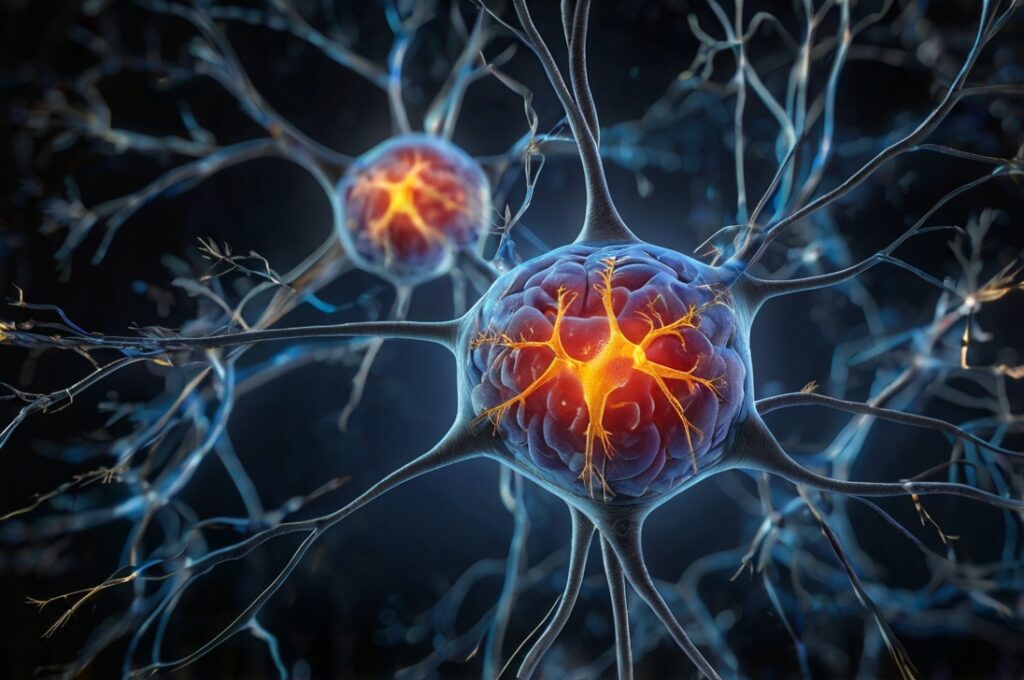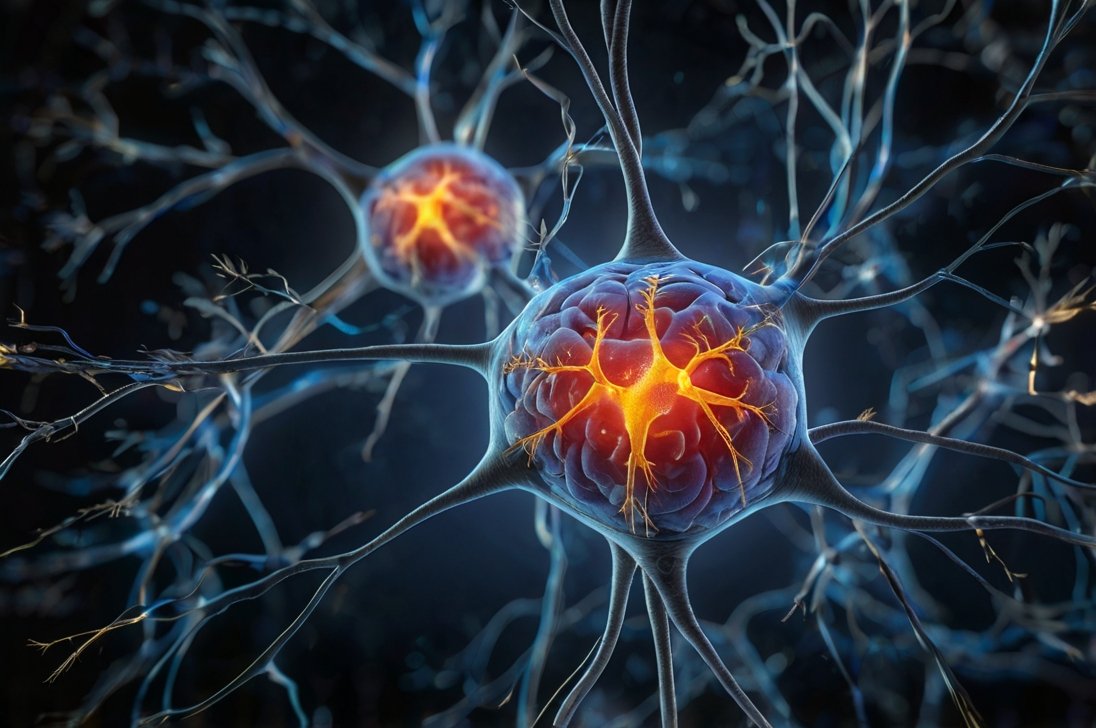
In our brains, neurotransmitters act as chemical messengers, passing signals between nerve cells (neurons) to regulate a vast range of bodily functions and behaviors.
From mood regulation to muscle contraction, neurotransmitters play a crucial role in maintaining our mental and physical health.
When these chemicals are imbalanced, it can lead to a variety of symptoms that affect our cognition, emotions, and physical well-being.
This blog post will explore the symptoms of neurotransmitter imbalance, the factors that can affect neurotransmitter levels, and the treatment options available for those struggling with this condition.
Factors That Can Affect Neurotransmitter Levels
Neurotransmitter levels in the brain can be influenced by a variety of factors, and understanding these can help identify potential imbalances and address them effectively.
Genetics
Our genes play a role in how neurotransmitters function.
Some people have genetic variations that affect the production and activity of neurotransmitters like serotonin and dopamine, making them more susceptible to mood disorders.
Diet and nutrition
The food we eat plays a crucial role in neurotransmitter production.
For instance, serotonin is made from tryptophan, an amino acid found in foods like turkey, chicken, and eggs.
If your diet lacks these nutrients, it could lead to lower neurotransmitter levels.
Stress
Long-term stress can deplete neurotransmitters such as serotonin and dopamine, contributing to feelings of anxiety and depression.
Stress also raises cortisol levels, a hormone that can further disrupt neurotransmitter balance.
Substance use
Alcohol, drugs, and some medications can alter neurotransmitter levels.
For example, heavy alcohol use can reduce serotonin levels, while stimulant drugs like cocaine can deplete dopamine over time.
Hormonal changes
Changes in hormone levels, such as those during puberty, pregnancy, or menopause, can affect neurotransmitter levels and potentially contribute to mood swings or disorders.
Medical conditions
Certain health conditions, such as chronic fatigue syndrome, fibromyalgia, and irritable bowel syndrome (IBS), are associated with neurotransmitter imbalances.
These conditions often coexist with anxiety and depression, suggesting a shared underlying cause.

Symptoms of Neurotransmitter Imbalance
A neurotransmitter imbalance can manifest in a variety of ways, affecting cognitive function, emotional stability, and physical health.
Below are some common symptoms associated with this condition:
Cognitive Symptoms
Difficulty concentrating
A neurotransmitter imbalance can make it hard to focus on tasks, follow conversations, or maintain attention.
You might find it challenging to follow conversations, complete tasks, or maintain attention, especially in work or school settings where focus is crucial.
Memory problems
Disruptions in neurotransmitter function can lead to memory issues, like forgetting appointments or misplacing things.
This is common in conditions like depression and anxiety, where neurotransmitter levels are often affected.
Brain fog
Brain fog describes a sense of mental cloudiness, where you’re thinking feels slow and less clear.
This can make it difficult to make decisions or solve problems effectively.
Poor decision-making
An imbalance in neurotransmitters can affect your judgment, making it harder to make sound decisions.
You might find yourself acting impulsively or struggling to weigh options carefully.
Learning difficulties
If you’re dealing with a neurotransmitter imbalance, learning new information or skills can be tougher.
This is often related to problems with concentration and memory.
Emotional symptoms
Mood swings
Rapid and unpredictable changes in mood, ranging from happiness to sadness or anger, can indicate a neurotransmitter imbalance.
This is often seen in conditions like bipolar disorder, where neurotransmitter levels fluctuate.
Anxiety
High levels of stress and worry, even in non-threatening situations, can result from an imbalance in neurotransmitters like serotonin and gamma-aminobutyric acid (GABA), which help regulate mood and anxiety.
Depression
Low levels of serotonin, dopamine, and norepinephrine have been linked to depressive symptoms such as persistent sadness, loss of interest in activities, and feelings of hopelessness.
Irritability
Feeling easily annoyed or frustrated, even by small things, can indicate a neurotransmitter imbalance.
When levels of serotonin or dopamine are low, it can be harder to keep calm and manage your emotions.
Anger management issues
Struggling to control anger or experiencing frequent outbursts may be linked to low serotonin levels.
Serotonin plays a key role in regulating mood and emotional responses, so when it’s low, it’s easier to become overwhelmed by anger.

Physical Symptoms
Fatigue
Persistent tiredness or lack of energy, even after a full night’s sleep, can be a result of disrupted neurotransmitter activity.
Fatigue is often seen in conditions like chronic fatigue syndrome and depression.
Sleep disturbances
When neurotransmitters like serotonin and GABA are out of balance, it can be hard to fall asleep, stay asleep, or get restful sleep.
This can lead to feeling tired and sluggish during the day.
Changes in appetite
Neurotransmitter imbalances can cause appetite changes, such as increased cravings for carbohydrates and sugar or a reduced desire to eat.
This is often seen in conditions like depression and anxiety.
Digestive problems
Serotonin doesn’t just affect mood; it also plays a role in how your gut works.
An imbalance in serotonin levels can lead to digestive issues like bloating, constipation, or diarrhea.
Headaches
Frequent headaches or migraines can be linked to neurotransmitter imbalances, particularly involving serotonin and dopamine.
Muscle tension
Chronic muscle tension, especially in areas like the neck and shoulders, can be a sign of stress and anxiety.
This tension is often related to dysregulation of neurotransmitters, which can make it harder for your body to relax.
Other symptoms
Social withdrawal
Losing interest in social activities or avoiding interactions with others can be a sign of neurotransmitter imbalance.
This is common in conditions like depression and social anxiety disorder, where it becomes difficult to engage with others.
Substance abuse
People dealing with neurotransmitter imbalances may turn to alcohol or drugs in an attempt to self-medicate.
This is often an effort to cope with symptoms of anxiety, depression, or other mood disorders.
Addiction
When substance use becomes chronic, it can lead to addiction.
This not only worsens neurotransmitter imbalances but also creates a cycle of dependence and ongoing mental health challenges.

Treatment Options for Neurotransmitter Imbalance
Addressing neurotransmitter imbalances often requires a comprehensive approach that includes lifestyle changes, therapy, and sometimes medication.
Here are some common treatment options:
Medication
- Antidepressants: These medications, like selective serotonin reuptake inhibitors (SSRIs), are often used to increase serotonin levels in the brain.
- Anti-anxiety medications: These can help manage symptoms of anxiety by affecting neurotransmitter levels.
- Mood stabilizers: Used to help balance mood swings and manage conditions like bipolar disorder.
Therapy
- Cognitive-Behavioral Therapy (CBT): This type of therapy helps people identify and change negative thought patterns and behaviors.
- Other psychotherapies: Different forms of therapy can support mental health by exploring underlying issues and helping individuals build healthier thought and behavior patterns.
Diet and nutrition
Eating a balanced diet is crucial for supporting neurotransmitter function.
Nutrients like omega-3 fatty acids, found in fish such as salmon and in walnuts, are important for brain health.
A well-rounded diet can help ensure that your body has the building blocks it needs to produce neurotransmitters.
Exercise
Regular physical activity can boost the production of neurotransmitters like serotonin and endorphins.
Exercise not only improves mood but also helps reduce anxiety and stress, contributing to overall mental well-being.
Stress management
Techniques such as mindfulness, meditation, and yoga can help lower stress levels and promote relaxation.
Reducing stress is important because high stress can disrupt neurotransmitter balance.
Supplements
In some cases, supplements like magnesium, vitamin B6, and L-tryptophan may be recommended to support neurotransmitter function.
However, it’s important to consult with a healthcare professional before starting any supplements to ensure they’re appropriate for your needs.

Final Thoughts
Neurotransmitter imbalances can have a profound impact on our mental and physical health, leading to a range of cognitive, emotional, and physical symptoms.
Understanding the factors that contribute to these imbalances and recognizing the signs can help us take proactive steps toward restoring balance and improving our well-being.
If you suspect that you may be experiencing symptoms of neurotransmitter imbalance, it’s important to consult with a healthcare professional who can provide guidance and recommend appropriate treatment options.



